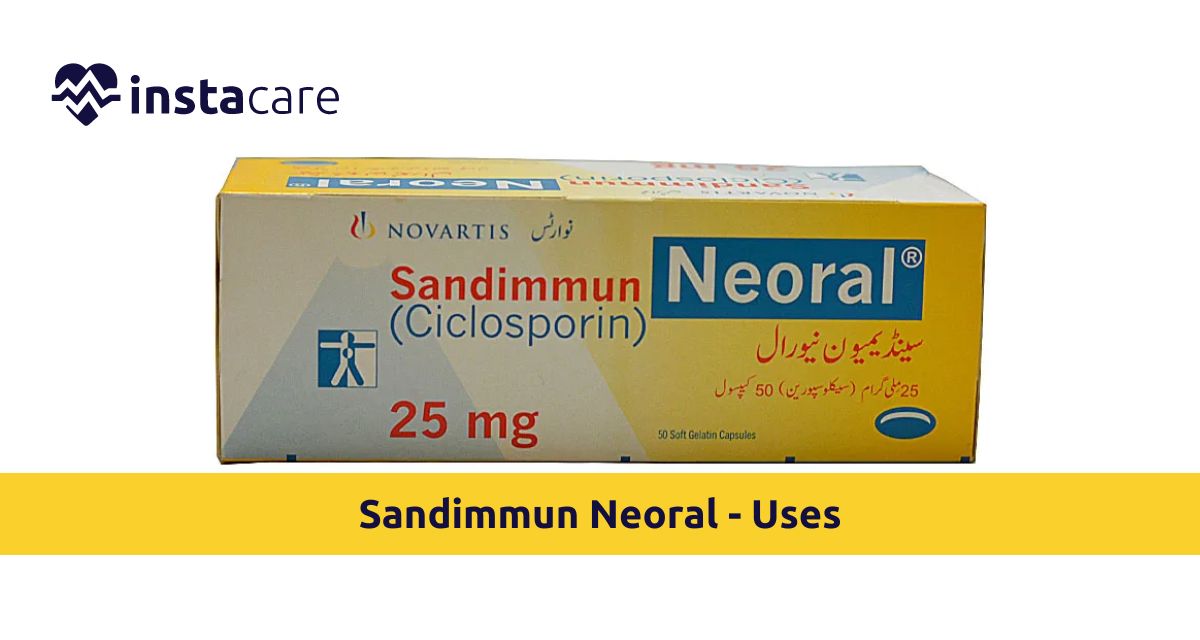Sandimmun Neoral is a representation of a type of
immunosuppressant drug used in suppressing organ rejection in patients who
have undergone organ transplant operations. It works by modifying the drug
cyclosporine for the suppression of a patient's immune system so that
interoperates well and does not turn against the transplanted organ to reject
it.
Sandimmun Neoral was accepted for application in organ transplantation as far back as 1983, and through the years, it has grown to become one of the most applied immunosuppressive drugs today. This is thus immense progress in terms of bioavailability, and very much more homogeneous drug levels of the body, compared to the old galenic form Sandimmun.
Uses of Sandimmun Neoral
The main use of Sandimmun Neoral is to prevent rejection of organs in patients who have undergone the following types of organ transplantation:
- Kidney transplantation
- Liver transplantation
- Heart transplantation
- Lung transplantation
- Pancreas transplantation
Sandimmun Neoral works by stopping the signals that activate T-cells, one type of WBC responsible for inducing an immune response inside the human body. With the limitation of the activation process of T-cells, very little chance remains to recognize the transplanted organ as "foreign" and then be attacked by the recipient's immune system.
Other indications of Sandimmun Neoral, other than allograft rejection, have also been observed for the following certain diseases wherein activities of the immune system are overly at par, as follows:
- Rheumatoid arthritis
- Psoriasis
- Nephrotic syndrome
- Severe atopic dermatitis
Diminution of inflammation and autoimmune activity in these diseases is achieved by this immunosuppressive drug, Sandimmun Neoral.
Advantages of Sandimmun Neoral
The prime advantage of Sandimmun Neoral is that the drug prevents rejection of an organ after it has been transplanted. Many clinical trials conducted on the drug have proved that the survival rate of the transplanted organ can be increased in the long term by using Sandimmun Neoral much more than the older forms of immunosuppressive drugs.
View More: Caflam Tablet - Uses Side Effects And Price In Pakistan
Some key benefits of Sandimmun Neoral are:
Bioavailability
Neoral is a form of cyclosporine that has better bioavailability. When compared to the original Sandimmun formulation, more of the drug will, therefore, be absorbed into the bloodstream. This can provide uniform levels of drugs in the body and hence improved efficacy.
Reduced Dosage Requirements
As a consequence of increased bioavailability, the daily dose of Sandimmun Neoral to be taken by a patient is lesser than the original Sandimmun. This would help minimize side effects.
Reduced Incidence Of Acute Rejection
Clinical trials have been reported to indicate that Sandimmun Neoral is better in minimizing the acute rejection episodes during the first year post-transplantation, compared to the original Sandimmun formulation.
Long-Term Results
Long-term studies associate the use of Sandimmun Neoral with
preservation of proper transplanted organ function and a higher survival of
patients during such a period.
Evidence for efficacy for autoimmune and inflammatory diseases other than in organ transplant recipients is established; by leading to the suppression of overactive immune response, Sandimmun Neoral relieves symptoms and progressive courses of diseases.
Risks and Side Effects of Sandimmun Neoral
A generally well-tolerated medication, Sandimmun Neoral still has some risks and side effects that might be associated with its use. Common side effects include:
- High blood pressure
- Kidney problems, including impairment of kidney function
- Increased risk for infections due to the general suppression
of the immune system
- Tremors or shaking
- Headaches
- Digestive problems, including nausea, vomiting, or diarrhea
- Growth of excessive amounts of body hair
- Gingival hyperplasia or overgrowth of the gums
The more severe potential side effects include the increased
risk of developing certain types of cancers; two of the primary ones are
lymphoma and skin cancer. Other general immunosuppression complications can be
an increase in the risk of infections.
This calls for close monitoring by the treatment team while under Sandimmun Neoral treatment, which should also include regular blood tests to check on kidney functioning and measurement of the levels of the drug, among other factors. The dosage may increase or be lowered with time to retain the slim balance between prevention of rejection on one hand and minimizing side effects on the other.
Furthermore, patients should inform their doctor immediately
when they identify troublesome symptoms or worrisome side effects. Very
commonly, withdrawal from the medicine or reduction in dosage will be required
when troublesome side effects develop.
Although these are risks, most patients find the benefits of Sandimmun Neoral against rejection usually outweigh its prospective downsides, especially to those who have benefited from lifesaving organ transplants. Careful management and monitoring allow
most patients to go on the medication quite well and reap improved results.
Conclusion
Sandimmun Neoral is an extremely vital drug for all patients
who have undergone organ transplants, as it prevents the body from rejecting the
inserted organ. By accumulating more bioavailability and rendering more uniform
levels of the drugs in the body, Neoral offers greater long-term outcomes over
the original Sandimmun for any transplant recipient.
While there are risks and probable side effects for
Sandimmun Neoral, these are normally controllable if medically supervised and
monitored. On the other hand, though there are prospective disadvantages, the protection of their transplanted organ through the use of Sandimmun Neoral, to
most transplant patients, far outweighs the risks.
By understanding the uses, benefits, and risks in transplant patients, clinicians, and their patients would then have full information to decide on the use of Sandimmun Neoral and finally collaborate on optimization treatment to reduce possible complications. If dealt with properly, Sandimmun Neoral offers the best chance that a transplant receiver will have a fit and healthy life with his or her new organ.

